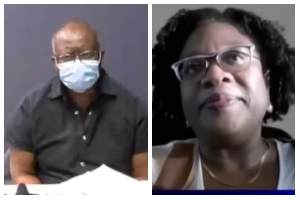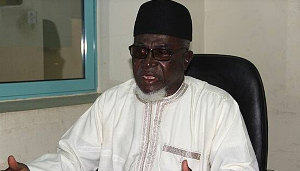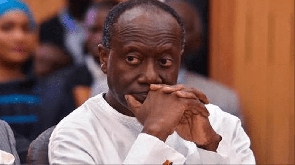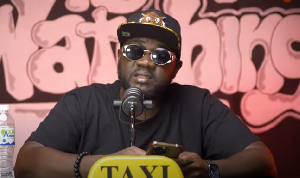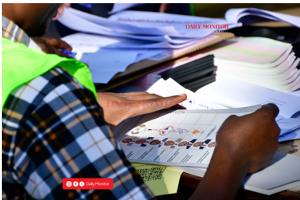I Have Always Been Fascinated By China’s Rapid Development And Wondered Why Ghana Cannot Follow Suit.
By: Otchere Darko
From two observation angles, my mind conjures two sets of conclusions that consign Socialism or Communism to a two-faced transmutational image.....good this way, and bad that way; angelic now, and devilish next; loved here, and hated there. It is this Marmite-like, “hate-me” and “love-me” ambivalence of Socialism that puzzles me and makes me wonder whether this system that has tremendously worked for China can also work for Ghana.......given that Ghanaian communities are, traditionally, solidly modelled on a pyramidal feudal class structure system. *Readers should not, however, forget that wherever Socialism or Communism is practiced, some forms of “force” and “indoctrination” are used by the ruling class, or authority to make the system generally applicable to, and acceptable by people, since its workability is completely based on “collectiveness”. From the former Soviet Union to today’s China, to Cuba, to North Korea, etc, Socialism or Communism has always involved the sacrifice of individual human rights and the rule of law. Thus, despite its immense social benefits, I personally doubt whether this “love-me-here” and “hate-me-there” image of Socialism or Communism will lend itself to any multifarious society where class structures are firmly established and within which people at the upper echelon of that society are unwilling to sacrifice their fundamental human rights; and where, also, such people at the upper echelon cannot be “forced” to sacrifice rights they do not want to sacrifice. Accordingly, the question I have always asked myself has been: “From the numerous traditional rulers at the top, down to the man on the street at the bottom of the ladder, will we, Ghanaians, sacrifice our basic freedoms, including the rule of law, and allow our country to follow the path of Socialism or Communism, even if we can be hundred percent sure that all of us, big and small, will be better off in the longer run?” I have personally always doubted whether Ghanaians generally will make this sacrifice. And if we will not freely accept Socialism or Communism, can any Ghanaian Government defy national will and international pressure to apply a “Tiananmen-Square-Massacre” type of repression to extract the “obedience” and enforce the “compliance” that can make such leftist ideology to stay and work in a pro-capitalist Ghana? And can there be a Castrol or a Gaddafi in Ghana who can apply the force needed to let this happen? Did Nkrumah “kill” and “brutalise” hundreds of Ghanaians, if any, before he was branded “a dictator” and overthrown by Kotoka and Afrifa? Could Akyeampong use his “UNIGOV” idea to keep himself in power for even two years before Ghanaian anger and protests forced his own next General in command to remove him in a Paris coup? Could “trigger-mad” Rawlings kill and brutalise several thousands of people before Ghanaians matched on him with their “enough-is-enough” “kume-preko” demonstrations and forced him to bow to public demand? *The point I am trying to establish here is that certain things that work in some settings do not work in other settings. Again, the Castrols and the Gaddafis may exist everywhere in the world but it is not in every country that they can be “everlasting”. In fact, the political history of Ghana shows that Ghanaians do not tolerate any system, or intervention that interferes with their basic human rights. There are certain sociological factors in Ghana that account for this. A couple of these are discussed below.
(1) The Traditional Power Structures In Ghana: The pre-colonial traditional structures in Ghana were never destroyed before independence, even after over hundred years of British rule. Instead, the British colonialists were compelled by the enormity of their “powers” to concede the invincibility of Ghanaian traditional rulers and, therefore, use the well-established set-ups under them to facilitate their own colonial rule, through what became known as “indirect rule”. Thus, despite colonialism and Western influence, Ghana has remained traditionally monarchical and structurally feudalistic, with nearly all Ghanaian lands still vastly controlled by traditional rulers and their subjects. I am not sure whether there is any country anywhere in the world that has more chiefs per each square mile of territorial landmass than Ghana has. I also doubt whether any statistician in Ghana can tell the total number of kings, paramount chiefs, ordinary chiefs, and sub-chiefs that we have in the whole country, unlike Britain or Spain, or other places with monarchies, where one can easily give this information. Below each of these Ghanaian monarchs who exercise control over nearly all Ghanaian lands, there is also a whole array of elders and royalists who are part of the traditional power system and who number several times more than the monarchs themselves. Beneath these elders and royalists also, there are the traditional subjects who always feel affiliated to their traditional rulers and who continue to pay allegiance and homage to them, despite any modern systems of administration that have been superimposed on the traditional system. During the periods of colonial infiltration, there was nowhere in Ghana where people failed to get together to defend their rulers and their communities when they felt threatened by outsiders. In effect, the way Ghana is traditionally structured, it will be very difficult for any Government or political leader, military or civilian, to attempt to override the civil liberties of Ghanaians for a long time without people taking up “arms” to oppose in one way or the other. This may explain why Ghanaian military leaders did not venture to extend their military power over traditional rulers, or abolish chieftaincy when they embarked on their “military revolutions”. Apart from Ghana, where else in the world have there been series of successful major “military revolutions” during which existing monarchs and royalists have been left “untouched”? Despite their guns and their erratic nature, Ghanaian soldiers who overthrew civilian or other military regimes were “scared” of “touching” these well-protected traditional rulers. Socialism or Communism everywhere takes power from monarchs, aristocrats, the rich, and the privileged class; and gives it to workers and the poor. Where this kind of power transfer is not possible, such as in Ghana, Socialism or Communism cannot work. Dr Nkrumah, the only true socialist leader Ghana has ever had, embraced Socialism with his heart and his mind; but he ruled a country that was not structurally designed for Socialism or Communism. Thus, though genuinely painful, Nkrumah’s fall was “pathologically” bound to happen. *You do not plant tomato seedlings beneath a “dense forest canopy” and expect them to survive and produce fruits.
(2) The Ghanaian Capitalist Mindset: Beside the Ghanaian traditional power structures which militate against Socialism, the general Ghanaian mindset is pro-capitalist and anti-socialist. Apart from Dr Nkrumah who was a genuine socialist and who never even cared to build and own a family house, all the other so-called “socialists” who have paraded the Ghanaian political scene at different times in the past have been “fakes” mainly, if not always. Contemporary Ghanaian leaders, politicians, and journalists too who claim to be pursuing socialist agendas are just deceiving Ghanaians. They all have a capitalist mindset; and are all individual “wealth-seekers” who hide under the banner of Socialism in order to be able to penetrate the corridors of power with ease. But once they succeed to gain political power, they use it to line up their private pockets by abusing their offices for financial gain. We should stop believing them when they shout “Socialism-Socialism”. I will prefer Ghanaian politicians who openly declare that they are pursuing capitalist agendas. We can know them; and we can keep an eye on them. But, when they are pretenders behaving like “wolves in sheep’s skins”, they can steal more than the open capitalists and succeed to hide their “booties” in “bunkers”, because we do not suspect them; and, also, because they throw “crumbs” of their stolen wealth to unsuspecting poor followers who trail and hail them, just as medieval “Roman mobs” used to do. These fake socialists are certainly more dangerous than their capitalist counterparts, because the later operate openly, while the former operate under “bunkers” and are, therefore, difficult to detect. Generally, though, all Ghanaian politicians are capitalists in practice. If we fail to acknowledge this fact, then we will make it difficult for this country to chart a clear developmental path, because we will encourage these fake “socialist politicians” to hide behind the “banner of Socialism” and deploy the “machinery of State” to siphon public monies into their private pockets.
We always wrongly blame Western influence for our capitalist, exploitative and greedy behaviours. The fact, though, is that Ghana is a “capitalist nation” by our “inward” nature; by our community structures; and by our social orientation. Ghanaian leaders and politicians should, therefore, stop deceiving us. They should stop lying; and start to be realistic. They should understand that their greed and materialistic nature can never let them be socialists, even if the application of the system is feasible in Ghana. They must, therefore, learn to borrow some of the good ideas in Socialism and mix them with Capitalism, which is what their greedy hearts endorse; and which, also, is what Ghana is best structured for. By borrowing the best in Socialism and fusing them with the best in Capitalism, they can get the best political and economic blend that will help to remove, or reduce the painful effects of the “free-market” and “profit maximisation” ideas that are embodied in the more economically efficient, but less socially satisfying capitalist ideology.
Source: Otchere Darko. [This writer is a centrist, semi-liberalist, pragmatist, an advocate for “inter-ethnic cooperation and unity” and a community-based development protagonist. He opposes the negative, corrupt, and domineering politics of NDC and NPP; actively campaigns for the development and strengthening of “third parties”; and opposes a two-party only system of democracy in Ghana.]
Opinions of Saturday, 20 November 2010
Columnist: Darko, Otchere


